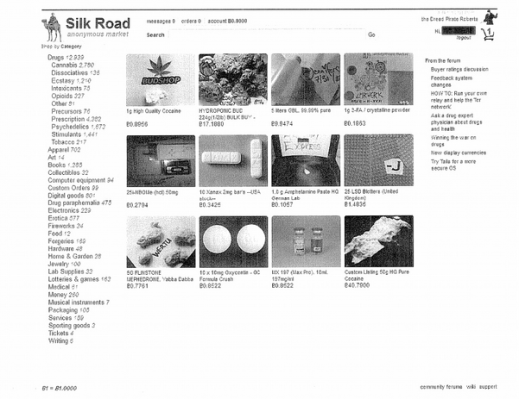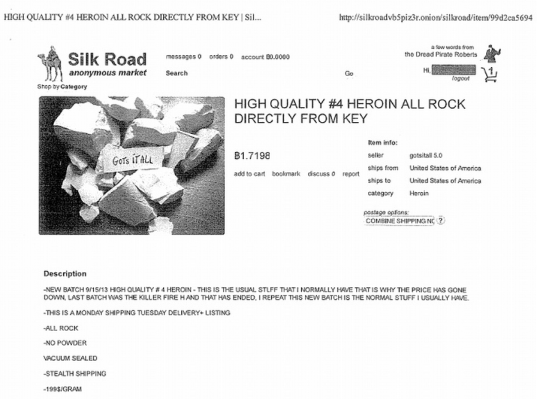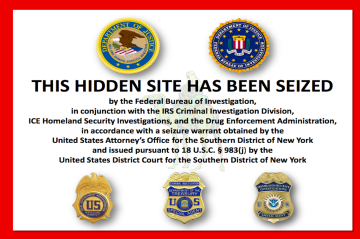On Wednesday the federal government raided and shut down online drug marketplace Silk Road and arrested its alleged proprietor, Ross William Ulbricht. Silk Road had been in operation since roughly January 2011, but was obscured from normal web traffic because it was hosted on something called the “Deep Web.”
If you’ve never heard of Silk Road or the Deep Web, or have heard of them but have trouble grasping the technology or concepts involved, this explainer is for you.
So what is Silk Road?
Silk Road is an online marketplace where users can purchase everything from illegal drugs to unlicensed firearms. It is hosted on the “Deep Web,” a collection of websites that are not indexed by search engines and thus hidden from public view. The deep web is accessible only by downloading special software called Tor, which anonymizes web traffic.
[More: Feds Raid Online Drug Market Silk Road]
How does the Deep Web work?
Think of every message sent through the Internet–whether it be an email, a tweet or traffic to a website–as being a mailbag full of letters. Your I.P. address, or “Internet Protocol” address, can be likened to the letters’ return address. When a user uses the Tor Browser bundle (which provides the Tor software plus a browser) instead of a regular browser like Chrome or Firefox, the letters become encrypted so that the content of the letters can’t be read. The encryption also obscures the return address, making it impossible to tell where the letters came from.
Tor then takes these encrypted letters (technically called “packets”) and passes them through a large network of routers, which are intermediaries that direct Internet traffic, much like a post office directs letters. The routers pass the letters back and forth between one another, further obscuring the letters’ source. Each time a letter passes through a router, it’s decrypted slightly, so that the router knows where next to send it, and re-encrypted. Eventually, each letter will reach a router designated as an “exit node,” where the final layer of encryption is decrypted, revealing the original. The letter is then stamped with the exit node’s IP address (like a new return address), and is sent to its destination.
This means that if a user accesses websites using Tor, their activity online is virtually anonymous and much more difficult to track than traffic passed through a typical browser like Chrome. People who want to do illegal things on the Internet, such as purchase drugs through Silk Road, use Tor so that their online activity is more difficult to track.
Websites on the Deep Web also have a different URL construction than websites on the “surface web,” the web we use every day. Domains on the Deep Web end with the extension “.onion” instead of the popular “.com”, and the text before the domain, such as “time” in “time.com,” is a series of randomly generated numbers and letters. Silk Road’s domain, for example, was http://silkroadvb5piz3r.onion.
If you try to go to a .onion URL on a normal browser like Chrome, it will not work. .onion URLs only work using the Tor software.
Who uses the Deep Web?
Though the Deep Web does have its share of criminals and hackers (just like the surface web), it also serves some pretty important functions. For one thing, Tor software can be used by citizens in countries with governments that closely monitor their Internet activity and curtail their free speech. The Tor project, the 501c3 nonprofit that maintains the Tor network and software, states on their website that journalists, militaries, law enforcement, activists and whistleblowers use Tor.
Who made the Deep Web?
The “Deep Web,” or Tor network, was actually originally funded by the U.S. Naval Research Laboratory, which developed the network with the hope that it could properly protect and encrypt government communications. From 2004 to 2005 it was supported by the Electronic Frontier Foundation, but is now run by the Tor Project. To this day it is still largely funded by government organizations across the world, including the United States.
Okay, so what can you buy on Silk Road?
Any sort of illicit drug like heroin, cocaine and methamphetamine could be procured on Silk Road before its shuttering, alongside illegal firearms, hacking tools like keylogging software, the services of hackers who promised hacks like infiltrating the Facebook or Twitter profiles of your choice, fireworks, forged documents and more.
How do you buy things on Silk Road?
If you wanted to purchase anything on Silk Road, you would first have to possess a type of online money called Bitcoin:
Created by a Japanese programmer named Satoshi Nakamoto (a pseudonym) in 2008, bitcoin is what’s known as a cryptocurrency. It’s both a decentralized currency and a payment system that exists entirely online, allowing users to exchange money anonymously.
Instead of inputting their credit card numbers, which even on the Tor network would make their purchases easy to track, Silk Road users instead purchased Bitcoin from an exchange like Mt. Gox, and then used those to make purchases on Silk Road. Silk Road also uses a special money laundering function called a “tumbler” that further anonymizes transactions.
Bitcoin’s value is based on the market; currently, one Bitcoin is worth about $115. Bitcoin can easily be exchanged for cash online.
What does Silk Road look like?
Once you downloaded Tor and navigated to http://silkroadvb5piz3r.onion, you’d be greeted with a login screen asking for your username and password. If you wanted to register for a new account, you’d follow the link for new users and all Silk Road required you enter was a username, password and country, and you would be registered as a new buyer. New seller accounts are limited, however, and must be purchased at auction.
Once inside, Silk Road looks like an average ecommerce website, albeit one stocked with drugs and guns and hacking equipment instead of clothes and home goods. In the complaint filed by the FBI yesterday, the agent responsible for investigating Silk Road included an example of what Silk Road looks like:
Is Tor still private?
Yes and no. Technically web traffic is still private on Tor as the network itself remains unchanged, but that doesn’t mean Tor users are completely untraceable, as Ulbricht’s arrest indicates.
This all sounds interesting. I think I’m going to download Tor and poke around Silk Road.
Glad you’re curious, but after the feds arrested Ross William Ulbricht, the alleged operator of Silk Road, they seized the website and shut down all operations. When you head to Silk Road now, all you’ll find is this message:
Oh okay, I wouldn’t want to get arrested anyway.
Going on the Deep Web won’t get you arrested. Plenty of people use Tor to access normal surface websites–like Time.com!–but opt to access the Internet through Tor, rather than directly with Chrome or other browsers for privacy reasons. Tor Browser can function like a normal browser, but it can also access “deep web” websites.
The Deep Web has become infiltrated with cybercrime because it is much more private than the surface web, allowing criminals to operate in the shadows. We don’t recommend exploring the Deep Web if you’re not very knowledgable about it, as it could leave your computer open to cyberattacks. If you do decide to explore the Deep Web, make sure you don’t click on any suspicious links, or you could end up looking at illegal and upsetting material like child pornography or snuff films.
[More: Alleged Black Market Operator Indicted in Murder-for-Hire Scheme]




